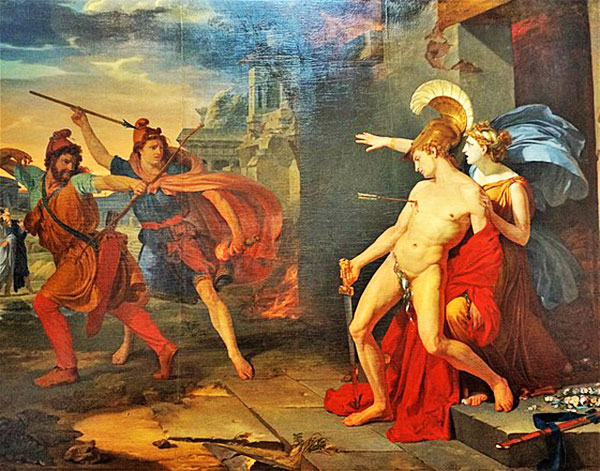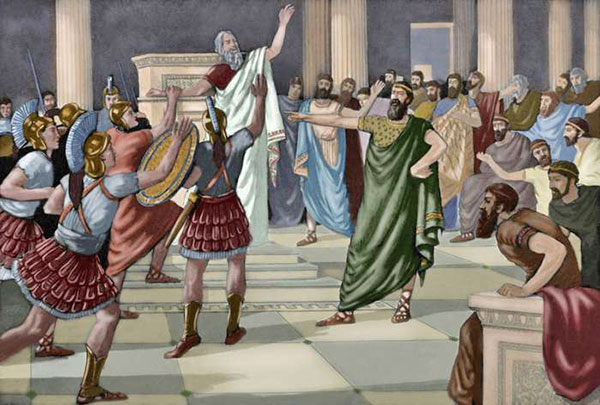|

by Van Bryan
July 17,
2020
from
ClassicalWisdom Website
Italian
version

Image
from
WSJ.com
Sometimes, late at night when we can hear the ocean outside our
window, we wonder what the ancients would think of us…
Would they be proud?
Amused?
Perplexed?
Surely, we imagine, we
won't repeat ALL the mistakes of our classical forebearers.
Somebody must have read Aristotle, Cicero, or
Thucydides.
As we're fond of saying…
no disaster has been
so disastrous… no calamity so calamitous… and no idea so idiotic
that somebody didn't give it a whirl over the millennia...
Somebody must have
surmised that there are lessons to be learned from people who
lived thousands of years before our "enlightened" time.

La mort d'Alcibiade, Philippe Chéry, 1791.
Musée des Beaux-Arts, La Rochelle.
[In 404 BC, Alcibiades, exiled in the Achaemenid Empire province
of Hellespontine Phrygia, was assassinated by Persian soldiers,
who may have been following the orders of Satrap Pharnabazus II,
at the instigation of Sparta.]
But no…
We seem determined - hell, eager! - to stumble headfirst into the
same quagmires of classical antiquity.
The old saying is
that you must learn history or else risk repeating it.
What they won't tell you is that those who do learn from history
have to stand by while everybody else repeats it.
The latest throwback comes in the form of ostracism-by-tweet...
That's right.
The grand old
classical tradition of banishing your fellow man for no real
reason is back. And in a big way...!
You know it as "cancel
culture."
But we're getting ahead of ourselves.
Let's first look at how the ancients did it.
Ostracism in
the Ancient World
In Aristotle's
Politics, he tells us that
ostracism was originally instituted
as a means to allow the common people to check the power of the
political players.

Critias, one of the Thirty Tyrants, ordering the execution of
Theramenes,
a fellow member of the oligarchy that ruled Athens in 404–403 BCE.
[Following Athens' defeat in the Peloponnesian War,
an oligarchic government was imposed on the city
by Lysander and the victorious Spartans.
This government, which came to be known as the Thirty Tyrants
as a result of its brutal actions, exiled or drove away a number of
citizens.]
It was a way to give claws to the hare when he was going up against
a lion.
…democratic states
have instituted ostracism; equality is above all things their
aim, and therefore they ostracise and banish from the city for a
time those who seem to predominate too much through their
wealth, or the number of their friends, or through any other
political influence.
Aristotle
(The Politics, Book III)
The procedure was rather
simple.
Plutarch tells us,
in his
Life of Aristides, that an
ostracism vote was held once a year.
The citizens were allowed to write the name of any political figure
on a shard of pottery.
Should anyone's name
get 6000 votes, then that person would be banished from Athens
for ten years.
What… we may wonder…
were grounds for ostracism?
Must your fellow citizen commit a high crime?
Perhaps treason?
Or murder?!

Voting
ostraca.
In
Classical Athens,
when
the decision at hand was to banish
or
exile a certain member of society,
citizen
peers would cast their vote by writing
the
name of the person on the shred of pottery;
the
vote was counted and, if unfavorable,
the
person was exiled for a period of ten years from the city,
thus
giving rise to the term 'ostracism.'
No… not really.
"I just don't like
the guy" was sufficient grounds to banish a man from the
hallowed walls of the polis.
Aristotle suggests as
much when he writes…
[Ostracism] has not
been fairly applied in states; for, instead of looking to the
public good, they have used ostracism for factious purposes.
That's right, dear
reader.
Ostracism was often
used as a means to banishing your enemies for not toeing the
line...
Fun fact:
Socrates could have
likely "chosen" ostracism over death during his trial in 399
BCE.
The philosopher was accused of "corrupting the youth" and
"believing in strange gods."
He was found guilty by his peers. But an interesting nuance of
classical Athenian justice demands that the defendant and the
prosecutor both suggest punishments in the event of a guilty
verdict.
Socrates' accusers chose death.
Socrates could have chosen - and likely would have been granted
- ostracism.
But no.
He offers a grand
feast and celebration as his penalty.
In essence, it was a
giant middle finger to the validity of the proceedings.

The Death of Socrates,
Jacques
Louis David
(French, Paris 1748–1825 Brussels),
ca.
1782. Source.
And given those choices, the Athenians choose death.
And that brings us to the 21st century…
#Ostracismculture
You might imagine our amusement when we first learned of "cancel
culture."
Yes, dear reader,
ostracism is back.
But put away those
shards of pottery.
Instead, hit the
retweet button...!
Writes journalist,
Matt Taibbi:
It's become a
cowardly mob of upper-class social media addicts, Twitter
Robespierres who move from discipline to discipline torching
reputations and jobs with breathtaking casualness.
The leaders of this new movement are replacing traditional
liberal beliefs about tolerance, free inquiry, and even racial
harmony with ideas so toxic and unattractive that they eschew
debate, moving straight to shaming, threats, and intimidation.
Source
Imagine how many people
the classical Athenians could ostracize if they only had Twitter!
Are you believing in
strange gods, dear reader?
Are you corrupting the youth with your "open debate"?
What scourge might you bring upon our glorious city with your…
ugh… tolerance of opposing ideas?
We simply can't risk it.
Out you go...

Dante in Exile by Domenico Petarlini.
In
March 1302, Dante, a White Guelph by affiliation,
along
with the Gherardini family,
was
condemned to exile for two years
and
ordered to pay a large fine to
the new
Black Guelph government.
Dante
refused and was condemned
to
perpetual exile;
if he
returned to Florence without paying the fine,
he
could have been burned at the stake.
You may already be familiar with the recently ostracized.
But if not, allow us to
bring you up to speed.
Taibbi again:
[F]rom a UCLA
professor placed under investigation for reading Martin Luther
King's "Letter
from a Birmingham Jail" out loud to a data scientist
fired* from a research firm for - get this -
retweeting an academic study
suggesting
nonviolent protests may be more
politically effective than violent ones!
[…]
In the most discussed incident, Times editorial page editor
James Bennet was ousted for green-lighting an anti-protest
editorial by Arkansas Republican Senator Tom Cotton
entitled, "Send in the troops."
#Ostracisimculsture
has gotten so bad that a slew of troublemakers got together to
sign "A
Letter on Justice and Open Debate."
I quote from the letter…
The free exchange of
information and ideas, the lifeblood of a liberal society, is
daily becoming more constricted.
While we have come to
expect this on the radical right, censoriousness is also
spreading more widely in our culture: an intolerance of opposing
views, a vogue for public shaming and ostracism, and the
tendency to dissolve complex policy issues in a blinding moral
certainty.
What a time to be alive
for those of us with a classical background and a sense of mischief.
We chuckle. We guffaw. We laugh heartily…. and then we sob.

Ovid Banished from Rome (1838)
by
J.M.W. Turner.
[Ovid,
the Latin poet of the Roman Empire,
was
banished in 8 AD from Rome to Tomis (now Constanţa, Romania)
by
decree of the emperor Augustus.]
Re-killing
Socrates
Have we learned
nothing from our ancestor's mistakes?
Are we so eager to
set fire to the intellectual scaffolding built over millennia?
Socrates was dubbed the
wisest of all men by the Oracle at Delphi, but not because he knew
the most.
Rather, the only thing the old teacher truly knew was that he knew
very little… perhaps nothing at all.
Hence the now-famous phrase:
All I know is that I
know nothing...
From here, the Socratic
tradition would teach us that we should accept humbly the limits of
our knowledge.
We should doubt every
certainty… question every unchallenged dogma…
And we should strive - sometimes awkwardly - towards
understanding by way of contemplation, discussion, and
introspection.

The School of Athens
by
Raphael (1509–1510),
fresco
at the Apostolic Palace, Vatican City.
The crowning achievement of the Socratic tradition was an emphasis
on, and appreciation for, good-faith inquiry.
Wisdom is the only
way to the Good.
And the only way to wisdom is to probe seriously, sometimes
contentiously, into the questions of life.
But, no…
We live now in an age
of saints.
We are surrounded by
enlightened soothsayers, untouched by sin or doubt.
Every moral truth is already known.
Every tepid question is taken as an affront.
And every gadfly is swiftly put to death.
We seem eager to kill the Socratic tradition just as they killed
the old man himself millennia ago.
What would the ancients
think of us?
We don't know…
But somewhere in a
far-off land, Socrates is rolling his eyes… and cursing under his
breath...
| 








